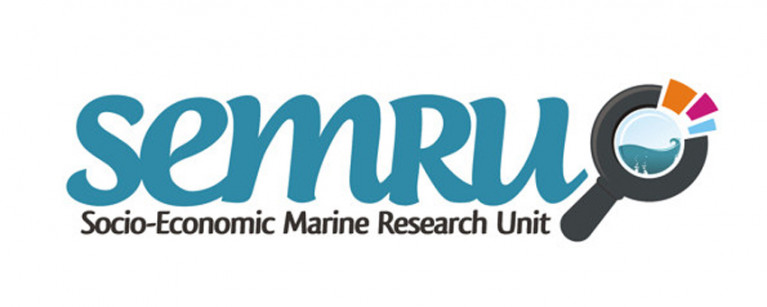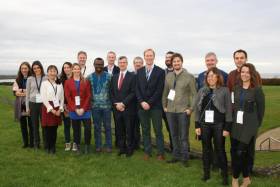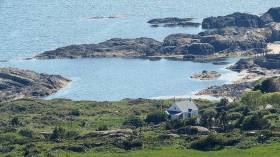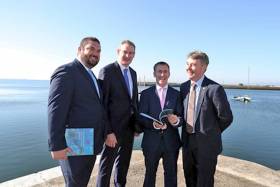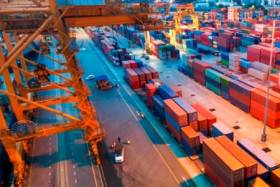Displaying items by tag: SEMRU
The Marine Institute and the Socio-Economic Marine Research Unit (SEMRU) at NUI Galway are conducting a survey of marine and marine-related businesses as part of the regular reporting on Ireland’s Ocean Economy.
Although the CSO and other State organisations provide some data on marine related economic activity, the Marine Institute says there is a need to supplement this data with company surveys across a number of sectors in the growing blue economy.
These include advanced marine technology products and services, offshore renewable energy, marine commerce and legal services, marine manufacturing, construction and engineering.
The survey began this month and will continue in July, with the results published later this year. In addition to general economic figures collected, this year’s survey includes a section on the impact of COVID-19 and other external factors effecting marine businesses.
Queries regarding the survey should be directed to Marie-Christin Lanser, scientific technical officer with the Marine Socio-Economic and Social Data Programme at [email protected] or Prof Stephen Hynes, director of SEMRU at NUIG at [email protected].
The Socio-Economic Marine Research Unit (SEMRU) at NUI Galway is now inviting applications from suitably qualified candidates for a four-year full-time, fixed-term contract as a postdoctoral researcher.
Working with colleagues in SEMRU, the successful candidate will produce research aimed at increasing our understanding of the role of maritime transport in Ireland’s economic growth, environmental sustainability and societal development.
They will explore the interconnectedness between the maritime sector and other sectors of the economy. Additionally, they will assess port policies in Ireland and examine what reforms, if any, to port policies are needed in light of recent national and global economic developments.
The successful candidate will also construct new economic models to explore the strategic development of ports and related infrastructure and the development of port policies that contribute to a competitive and effective market for maritime transport services.
The position is funded by the Marine Institute Post-Doctoral Fellowship Programme, and further details are available from the IMDO website HERE.
Symposium Celebrates 10 Years Of Marine Economics & Policy Research
The 10th Annual Marine Economics Policy Research Symposium, recently held at the Marine Institute’s Oranmore headquarters, provided a forum for researchers, scientists, economists and policy makers to present and exchange views on a wide range of topics.
Organised by the Socio-Economic Marine Research Unit (SEMRU) of NUI Galway’s Whitaker Institute with the support of the Marine Institute, the event was a space to discuss issues from the public perceptions of the oceans and marine spatial planning to marine and coastal tourism.
The 10th annual symposium also showcased the international collaborations that have been established between SEMRU and partner institutes through a number of EU projects.
The Marine Institute’s new chief executive Dr Paul Connolly welcomed the researchers, noting that SEMRU “has played a vital role in establishing a sustainable method of valuing our oceans”.
He added that the unit has “also undertaken complex research initiatives across a broad spectrum of areas, such as fisheries, maritime transport tourism and natural capital accounting”.
“Today, economic evidence is available to show the value — market and non-market — of our ocean resources with Ireland's marine sector recognised by Government and the State as an important national asset,” he said.
SEMRU presented the latest economic figures to Government in June 2019 as part of the Our Ocean Wealth Summit.
The latest figures show that Ireland’s ocean economy had a turnover of €6.23 billion and provided employment for 34,132 people (full time equivalents). The total direct and indirect value of Ireland's ocean economy is estimated by SEMRU to be in excess of €4.2 billion GVA (Gross Valued Added), equivalent to 2% of GDP.
Ireland’s integrated marine plan, Harnessing Our Ocean Wealth, outlines the Government’s target to increase the turnover from our ocean economy to exceed €6.4 billion by 2020 and double its value to 2.4% of GDP by 2030.
The symposium welcomed speakers from the Marine Institute; NUI Galwa; Department of Housing, Planning and Local Government; Údarás na Gaeltachta; Galway-Mayo Institute Technology; Trinity College Dublin; Queen’s University Belfast; and ABPmer.
Top women’s surfer turned marine biologist Dr Easkey Britton was among the international list of speakers whose presentations are available to download from the SEMRU website HERE.
Research Shows Visitors Spent Nearly €2bn In Ireland’s Coastal Areas In 2018
Overseas visitors holidaying in Ireland’s coastal areas spent €1.94 billion in 2018, while marine tourism generated €650 million in the same period.
That’s according to new research from NUI Galway’s Socio-Economic Marine Research Unit (SEMRU), which also identified activities such as coastal sightseeing, beach and island visits and walking, running and cycling along the coast as most popular among overseas visitors.
SEMRU’s Survey of Marine and Coastal Overseas Tourism Activity in Ireland was funded by the Marine Institute through the National Marine Research Programme as part of a larger project aimed at valuing and understanding the dynamics of Ireland’s ocean economy.
The survey found that while tourism and leisure comprise a key contribution to Ireland’s ocean and coastal economies, there is a gap nationally and internationally in trying to assess its value specific to marine and coastal areas.
SEMRU’s survey suggests that more than three-quarters (76%) of Ireland’s 7.9 million overseas visitors in 2018 are estimated to have visited a coastal area, while 61% are thought to have participated in a marine-related leisure activity.
The average total expenditure per travelling party in the survey sample was €1,630, with the average trip lasting seven days. Of this, an estimated €699 was spent in coastal areas.
The results also indicated that overseas visitors participate in coastal and marine tourism activities largely on the West Coast of Ireland, with Co Kerry leading over Co Galway and Co Clare.
Dr Niall McDonough of the Marine Institute said: “This report by SEMRU provides useful information to stakeholders and policy makers on the value and growth potential of this activity, which is so reliant on our rich coastal and marine resource.
“An analysis of research maturity, completed as part of developing the National Marine Research and Innovation Strategy, showed a gap in research capability in the area of tourism and leisure.
“These findings by SEMRU increase our knowledge in this area. As research in higher education institutions in Ireland is limited, however, the Marine Institute has also included a potential fellowship in its recent Post-Doctoral Fellowship Call.”
Applications under this call are being accepted until next Wednesday 18 September for proposals of three to five years in duration.
#OurOceanWealth - New research from NUI Galway’s Socio-Economic Marine Research Unit (SEMRU) focuses on the ecosystem service benefits that society receives from Ireland’s marine environment.
The latest bi-annual report — Valuing Ireland’s Marine Ecosystem Services — was launched at the recent fifth annual Our Ocean Wealth Summit in Galway by Damien English, Minister of State for Housing and Urban Development, and Seán Kyne, Minister of State for Natural Resources, Community Affairs, and Digital Development.
Marine ecosystem services are provided by the processes, functions and structure of the marine environment that directly or indirectly contribute to societal welfare, health and economic activities. These services are vital to ensuring blue growth in Ireland’s ocean economy, which was valued at €1.8 billion or approximately 1% of gross domestic product (GDP) in 2017.
Factoring marine ecosystem service values into ocean economy account frameworks may help to ensure a sustainable ‘blue economy’ for Ireland by making sure that growth in the ocean economy does not exceed the carrying capacity of the marine environment.
While the value of some of these goods, such as fishing and aquaculture, are somewhat easier to measure, the value of many other benefits — such as carbon sequestration, waste assimilation and marine-related recreation — are often not captured by a price in any established markets.
However, without incorporating these values into marine planning processes, these benefits may be ignored or underestimated leading perhaps to suboptimal decision making.
Marine Institute chief executive Dr Peter Heffernan welcomed the new report, commenting: “This assessment of Ireland’s marine ecosystem services and their value is an important step in incorporating ecosystem services into policy and decision making related to Ireland's marine and coastal zones.”
SEMRU director Dr Stephen Hynes added: “Blue growth is about fostering development in marine economic activities in such a manner that the long term ability of the marine environment to continue to provide ecosystem service benefits is not compromised.
“This is exactly what Harnessing Our Ocean Wealth: An Integrated Marine Plan for Ireland is aimed at achieving. Knowing what those benefits are and what they are worth is vital for deciding on the best use of our marine resources and to ensure blue growth for our ocean economy far into the future.”
Commenting on the significance of the report, Dr Micheál Ó Cinnéide, director of the office of communications and corporate services at the Environmental Protection Agency (EPA), said it “adds greatly to our understanding of the value of our marine province. Anybody who was able to see the marvellous RTÉ documentary on Ireland’s Deep Atlantic in 2018 and who follows the pioneering work of researchers in the Marine Institute, Galway and Cork can appreciate that we are unlocking the treasures of our offshore world.
“As this report shows, the true value has to include the natural capital, economic potential, cultural and spiritual values. The EPA and the Irish Forum on Natural Capital looks forward to a wider national debate on safeguarding this priceless marine ecosystem for future generations.”
Valuing Ireland’s Marine Ecosystem Services is based upon research supported by the EPA and is based on previous research conducted under the Marine Institute’s Beaufort Award.
The full report is available to download from NUI Galway, with the technical version on the EPA website.
Summary of economic contribution of marine ecosystem services:
- The provisioning marine ecosystem services of fisheries and aquaculture is estimated to be worth €473 million per annum to all fleets and producers operating in Irish waters.
- Seaweed harvesting is valued at €4 million and aquaculture at €150 million.
- The regulating and maintenance ecosystem services of carbon sequestration are valued at €815 million per annum, waste assimilation services €317 million and coastal defence services of €11.5 million.
- The cultural ecosystem services of scientific and educational services are valued at €11.5 million, and the added value per annum to housing stock of being at the coast (aesthetic services) is valued at €68 million. On an annual basis, recreational services provided by the marine ecosystems are estimated to have an economic value of €1.7 billion.
- Even though not all of the ecosystem services provided by the marine environment can be monetarised, the report indicates that the value of those that can is substantial.
#Ports&Shipping - Ireland’s shipping and transport sector was the largest contributor in terms of turnover to the growth of the country’s blue economy’ in 2016.
Shipping is also responsible for the FTE employment of 4,666 people, an increase of 6.7% since 2014, according to the latest report from the Socio-Economic Marine Research Unit.
Afloat.ie previously reported on figures from the fourth SEMRU report that show the ‘blue economy’ is outperforming Ireland’s general economy.
But the report also details now sea-based transport in particular accounted for 85% of the total volume and 56% of the total value of goods traded in Ireland in 2016, and continues to be the largest contributor to Ireland's ocean economy in terms of turnover and Gross Value Added (GVA).
The positive trend is also reflected in a report released earlier this year by the Irish Maritime Development Office (IMDO), the Irish Maritime Transport Economist, which records a 2% increase in total port traffic in 2016, the highest level of throughput achieved since 2007.
Speaking after the launch of Ireland’s ocean economy report during SeaFest 2017, Ireland’s national maritime festival, IMDO director Liam Lacey said: “Ireland has very ambitious targets set out in the Government’s integrated marine plan for Ireland, Harnessing Our Ocean Wealth, which aims to increase the value of Ireland's marine economy to 2.4% of GDP by 2030.
“The latest report published by SEMRU shows that we are well on course to achieve this, with our shipping and maritime transport sector contributing enormously to the growth and potential of our marine economy.
“As an island nation, we are heavily dependent on sea-based transport to link Ireland to world markets and I am delighted to see further positive indicators of the potential of this sector to contribute to wider economic growth in Ireland, and also its resilience in what was a very challenging year for business.”


























